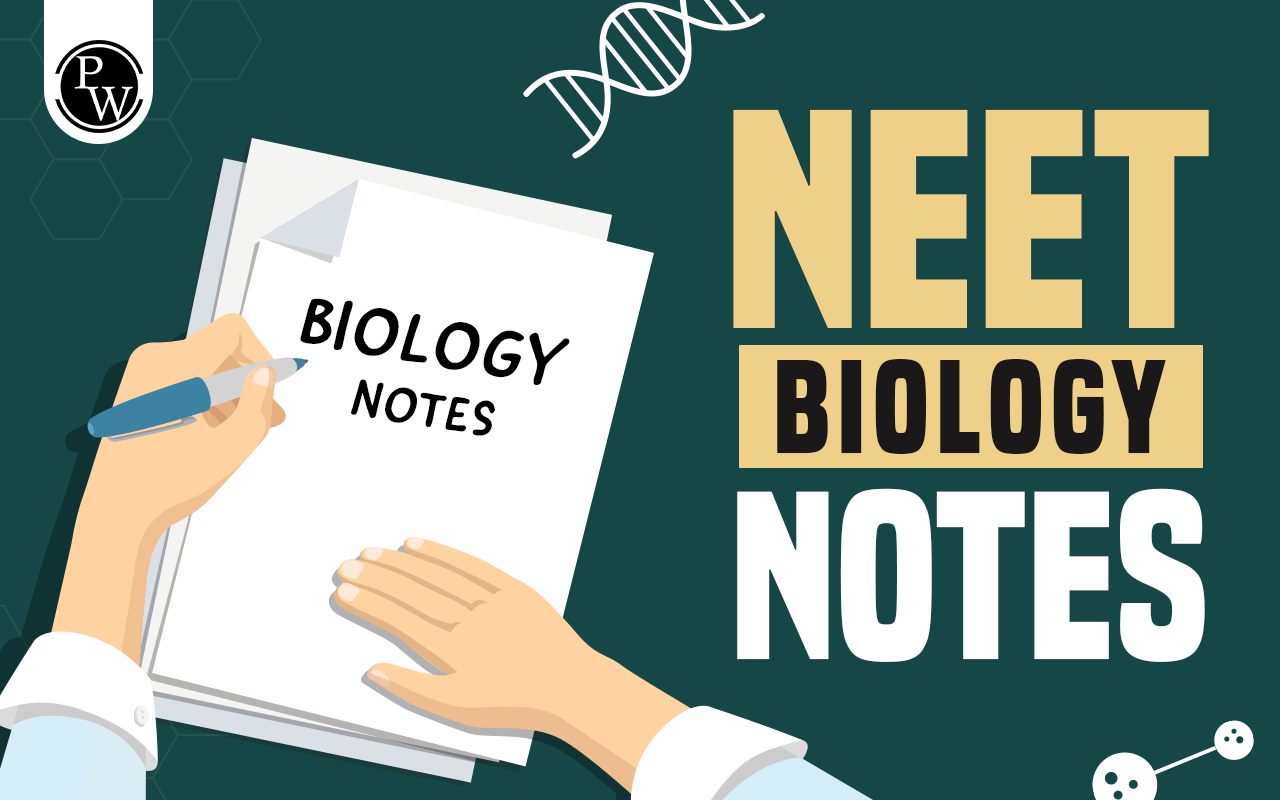
Number of Chromosomes in Humans: Humans have a total of 46 chromosomes, organized into 23 pairs in every cell of the body. Half of these chromosomes are inherited from the mother and the other half from the father. Of the 23 pairs, 22 pairs are called autosomes. These autosomes are responsible for the body's non-reproductive characteristics and are identical in both females and males. The remaining pair consists of the sex chromosomes, which determine an individual's sex. Females have two X chromosomes, while males have one X chromosome and one Y chromosome. Below are NEET Biology Notes on the number of chromosomes in humans.
Chromosomes Number in Humans
Humans have a total of 46 chromosomes, arranged in 23 pairs, as shown in the human chromosome karyotype image. These chromosomes carry the genetic information that determines our physical characteristics and traits.- 22 pairs (44 chromosomes in total) are called autosomes . These chromosomes are not related to sex and are the same in both males and females. They are numbered from 1 to 22, with chromosome 1 being the largest and chromosome 22 being the smallest.
- The remaining pair (2 chromosomes) are sex chromosomes . These chromosomes determine an individual's sex. Females have two X chromosomes (XX), while males have one X chromosome and one Y chromosome (XY). The Y chromosome is significantly smaller than the X chromosome and contains fewer genes.
Pairs of Chromosomes in Human Body
Humans have a total of 46 chromosomes, organized into 23 pairs. These chromosomes contain the genetic instructions that determine our traits.- Pairs of Autosomes in Humans:
- Autosomes are one of the two main types of chromosomes found in our cells. They are numbered and carry most of our genetic information.
- Humans have 22 pairs of autosomes, which means there are 44 autosomes in each cell.
- Autosomes are roughly numbered based on their sizes. The largest autosome is chromosome 1, which contains about 2,800 genes. The smallest autosome is chromosome 22, with around 750 genes.
| Pairs of Autosomes in Humans | ||
|---|---|---|
| Chromosome Number | Number of Genes | Base Pairs |
| Chromosome 1 | Over 3,000 genes | Over 240 million base pairs, approximately 90% known |
| Chromosome 2 | Over 2,500 genes | Over 240 million base pairs, approximately 95% known |
| Chromosome 3 | Around 1,900 genes | Close to 200 million base pairs, approximately 95% known |
| Chromosome 4 | Around 1,600 genes | Close to 190 million base pairs, approximately 95% known |
| Chromosome 5 | Around 1,700 genes | Close to 180 million base pairs, approximately 95% known |
| Chromosome 6 | Around 1,900 genes | Close to 170 million base pairs, approximately 95% known |
| Chromosome 7 | Around 1,800 genes | Close to 150 million base pairs, approximately 95% known |
| Chromosome 8 | Around 1,400 genes | Close to 140 million base pairs, approximately 95% known |
| Chromosome 9 | Around 1,400 genes | Close to 130 million base pairs, approximately 85% known |
| Chromosome 10 | Around 1,400 genes | Close to 130 million base pairs, approximately 95% known |
| Chromosome 11 | Around 2,000 genes | Close to 130 million base pairs, approximately 95% known |
| Chromosome 12 | Around 1,600 genes | Close to 130 million base pairs, approximately 95% known |
| Chromosome 13 | Around 800 genes | Close to 110 million base pairs, approximately 80% known |
| Chromosome 14 | Around 1,200 genes | Close to 100 million base pairs, approximately 80% known |
| Chromosome 15 | Around 1,200 genes | Close to 100 million base pairs, approximately 80% known |
| Chromosome 16 | Around 1,300 genes | Close to 90 million base pairs, approximately 85% known |
| Chromosome 17 | Around 1,600 genes | Close to 80 million base pairs, approximately 95% known |
| Chromosome 18 | Around 600 genes | Close to 70 million base pairs, approximately 95% known |
| Chromosome 19 | Around 1,700 genes | Close to 60 million base pairs, approximately 85% known |
| Chromosome 20 | Around 900 genes | Close to 60 million base pairs, approximately 90% known |
| Chromosome 21 | Around 400 genes | Close to 40 million base pairs, approximately 70% known |
| Chromosome 22 | Around 800 genes | Close to 40 million base pairs, approximately 70% known |
Structural Organisation in Animals
2. Pairs of Sex Chromosomes in Humans:- The remaining pair of chromosomes (the 23rd pair) are called sex chromosomes. These determine an individual's sex or gender.
- In females, the sex chromosomes are XX, while in males, they are XY.
- The X chromosome carries essential genetic information, while the Y chromosome determines maleness.
- The size of the sex chromosomes does not follow the same pattern as autosomes. For instance, even though it has a higher number, chromosome 21 is slightly smaller than chromosome 22.
Types of Chromosomes in Humans
Humans have two main types of chromosomes:- Autosomes: These chromosomes are not involved in determining sex. Each cell contains 22 pairs (44 total) of autosomes. They carry genes responsible for various physical traits, such as eye color, hair color, and height. The chromosomes in each pair are similar but not identical, with one chromosome inherited from the mother and the other from the father.
- Sex Chromosomes: These chromosomes determine an individual's sex. Females typically have two X chromosomes (XX), while males have one X and one Y chromosome (XY). The Y chromosome is much smaller than the X chromosome and contains genes essential for male sex development. The X chromosome carries genes that affect both sex-linked and non-sex linked traits.
| Important NEET Biology Notes | ||
|---|---|---|
| Selaginella | Embryo | Malvaceae |
| Pinus | Polyembryony | Volvox |
Ploidy of Humans
Ploidy refers to the number of complete sets of chromosomes found in the nucleus of a cell. This is commonly represented by the symbol “n”. In humans, chromosomes are categorized into two types:- Allosomes (sex chromosomes or gametes): These determine the sex of an individual and include the X and Y chromosomes. Females typically have two X chromosomes (XX), while males have one X and one Y chromosome (XY).
- Autosomes (body chromosomes): These chromosomes carry the bulk of genetic information and are responsible for most inherited characteristics. Humans have 22 pairs of autosomes, which are the same in both males and females.
| Important NEET Biology Notes | ||
|---|---|---|
| Chara | Funaria | Apomixis |
| Rhizopus | Spirogyra | Bacteriophage |
Human Male Karyotype
The karyotype of a human male consists of 46 chromosomes: 22 pairs of autosomes and one pair of sex chromosomes (XY). The monoploid number (x) in humans is equal to the haploid number (n), which is 23. This means that each human gamete (sperm or egg) contains 23 chromosomes. During fertilization, a sperm and an egg combine to form a diploid cell with 46 chromosomes (2n), with 23 chromosomes from each parent. Diploid cells contain two homologous copies of each chromosome. In some cases, cells may have a chromosome number that slightly differs from the typical diploid number (2n), but they can still function normally. For example, a person with Down syndrome has an extra copy of chromosome 21, resulting in 47 chromosomes in total. Most mammals, including humans, are predominantly diploid organisms, meaning their somatic (body) cells contain two sets of chromosomes. However, some cells can exhibit polyploidy, the presence of more than two complete sets of chromosomes. This is common in certain types of cells, such as liver cells and some plant species. To learn more about topics like the number of chromosomes in humans, NEET candidates should enroll in the best NEET courses for effective preparation. Physics Wallah offers the best NEET online coaching with expert teachers, a structured learning plan, and live classes for an interactive learning experience. PW NEET Online Coaching provides students with study materials, practice tests, and guidance from experts. Students can also practice with previous year's papers. All this at an affordable price. Enroll Now!| NEET Exam Important Links | |
|---|---|
| NEET Biology Syllabus | NEET Biology Diagrams |
| NEET Biology MCQ | NEET Biology Chapter wise Weightage |
| NEET Biology Notes | NEET Previous Year Question papers |
Number of Chromosomes in Humans FAQs
Q 1. How many chromosomes do humans have?
Ans. In humans, each cell typically contains 23 pairs of chromosomes, totaling 46 chromosomes. Among these pairs, 22 are autosomes, which appear the same in both males and females. The 23rd pair, known as sex chromosomes, differs between males and females.
Q 2. Which gender has 22 chromosomes?
Ans. Both males and females have 22 pairs of autosomal chromosomes, which are identical. Additionally, there is one pair of sex chromosomes that determines an individual's gender (X and Y chromosomes).
Q 3. Is XXY male or female?
Ans. XXY is characteristic of Klinefelter syndrome, a condition where males have an extra X chromosome.
Q 4. How much DNA is in a human?
Ans. Each human cell contains approximately 6 feet of DNA. Assuming an average of 10 trillion cells per person, this equates to around 60 trillion feet or roughly 10 billion miles of DNA. To put this in perspective, Earth is about 93 million miles away from the sun.
Q 5. Are males XY or yy?
Ans. Males have XY chromosomes. They produce two types of sperm: one carrying an X chromosome and the other carrying a Y chromosome. If an egg is fertilized by sperm with an X chromosome, the resulting individual is female (XX) and develops ovaries. If fertilized by sperm with a Y chromosome, the individual is male (XY) and develops testes.
Talk to a counsellorHave doubts? Our support team will be happy to assist you!

Check out these Related Articles
Free Learning Resources
PW Books
Notes (Class 10-12)
PW Study Materials
Notes (Class 6-9)
Ncert Solutions
Govt Exams
Class 6th to 12th Online Courses
Govt Job Exams Courses
UPSC Coaching
Defence Exam Coaching
Gate Exam Coaching
Other Exams
Know about Physics Wallah
Physics Wallah is an Indian edtech platform that provides accessible & comprehensive learning experiences to students from Class 6th to postgraduate level. We also provide extensive NCERT solutions, sample paper, NEET, JEE Mains, BITSAT previous year papers & more such resources to students. Physics Wallah also caters to over 3.5 million registered students and over 78 lakh+ Youtube subscribers with 4.8 rating on its app.
We Stand Out because
We provide students with intensive courses with India’s qualified & experienced faculties & mentors. PW strives to make the learning experience comprehensive and accessible for students of all sections of society. We believe in empowering every single student who couldn't dream of a good career in engineering and medical field earlier.
Our Key Focus Areas
Physics Wallah's main focus is to make the learning experience as economical as possible for all students. With our affordable courses like Lakshya, Udaan and Arjuna and many others, we have been able to provide a platform for lakhs of aspirants. From providing Chemistry, Maths, Physics formula to giving e-books of eminent authors like RD Sharma, RS Aggarwal and Lakhmir Singh, PW focuses on every single student's need for preparation.
What Makes Us Different
Physics Wallah strives to develop a comprehensive pedagogical structure for students, where they get a state-of-the-art learning experience with study material and resources. Apart from catering students preparing for JEE Mains and NEET, PW also provides study material for each state board like Uttar Pradesh, Bihar, and others
Copyright © 2026 Physicswallah Limited All rights reserved.









